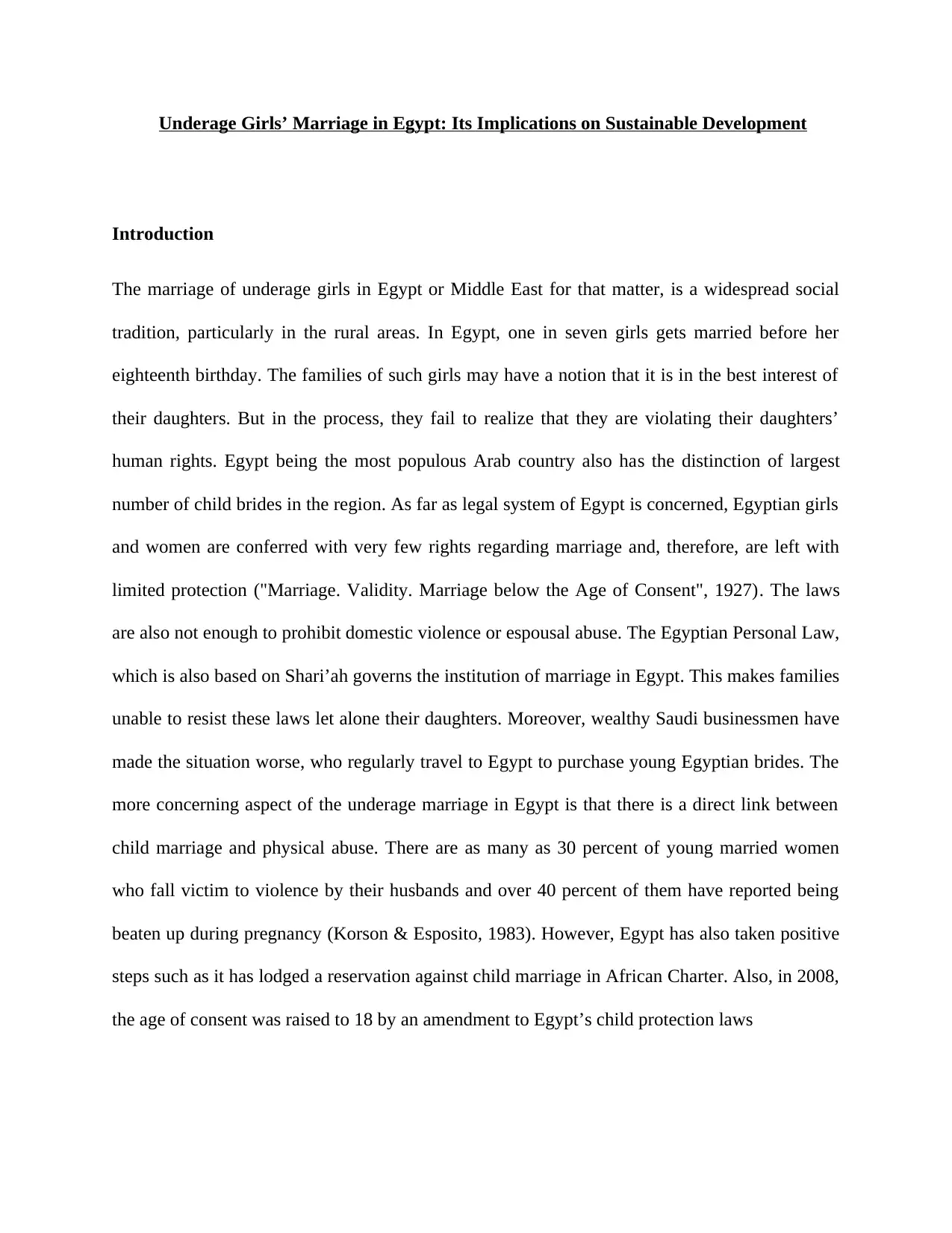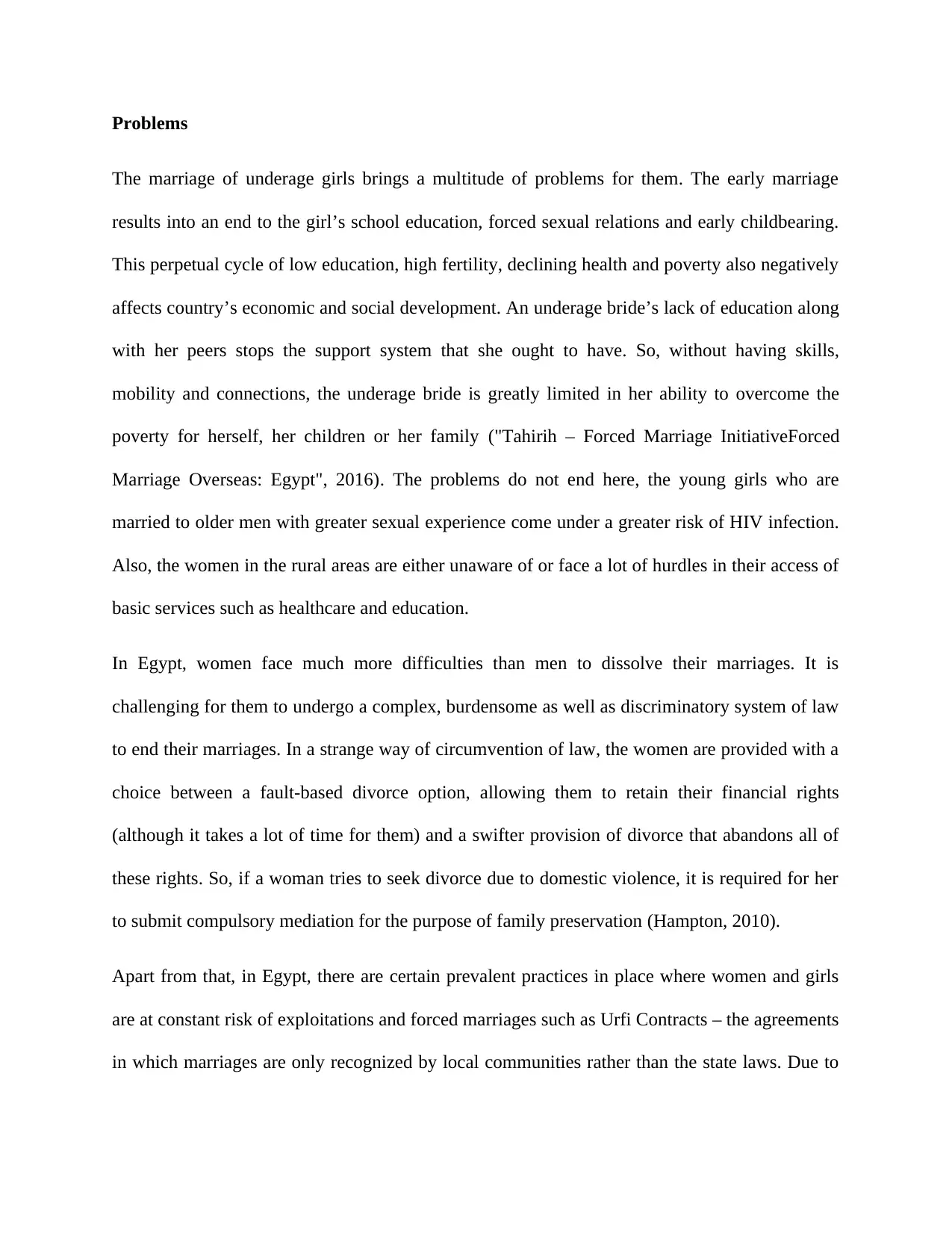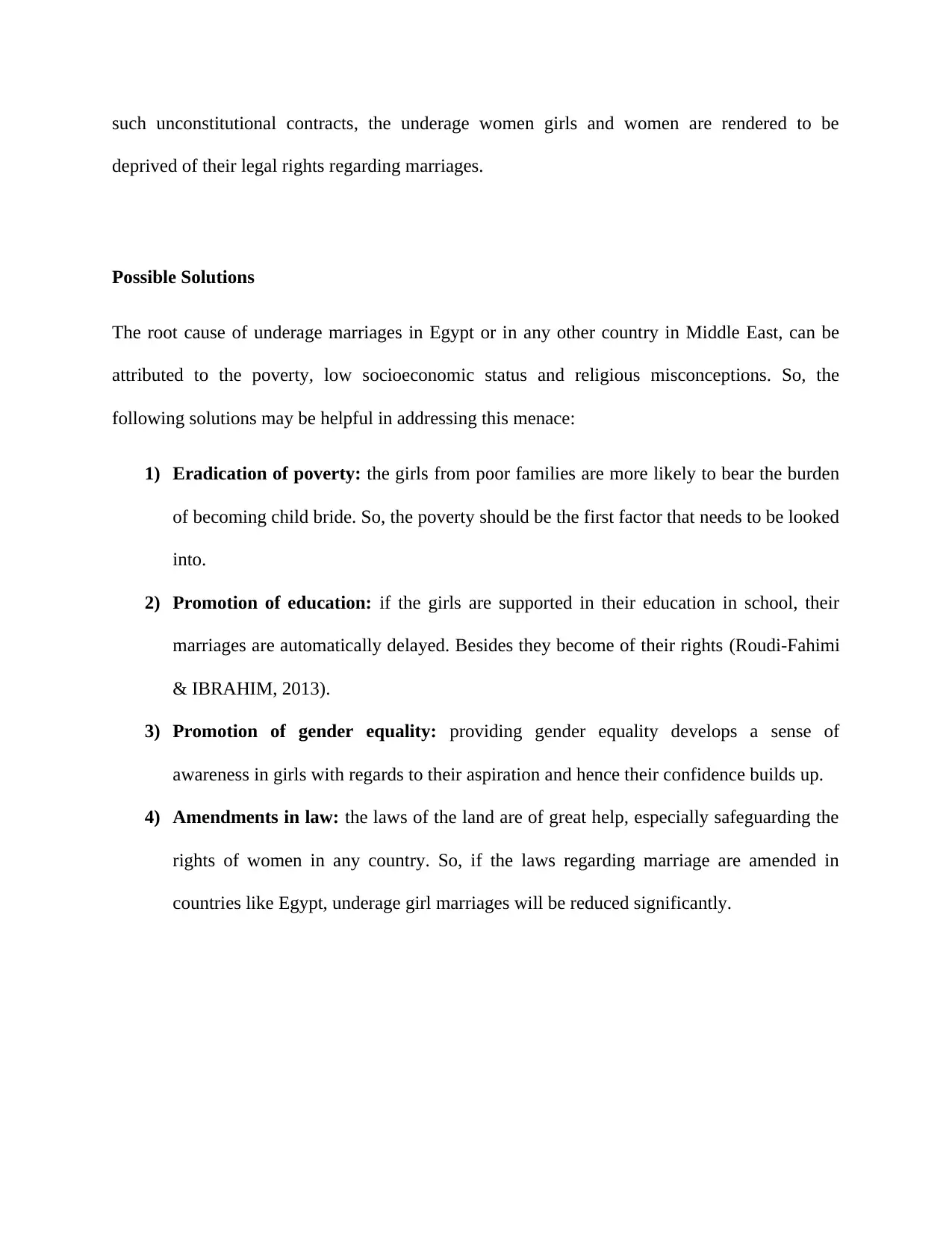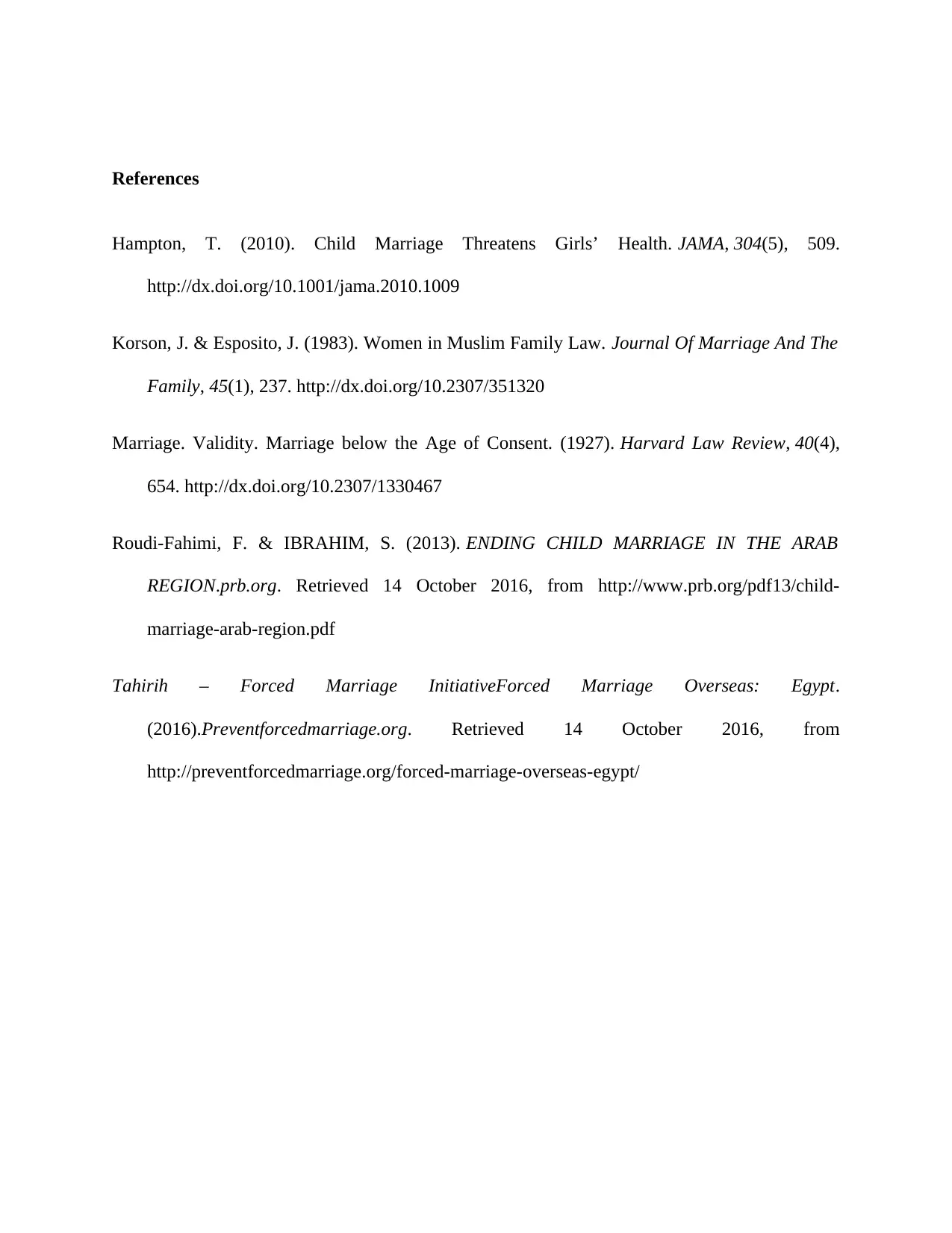Underage Girls' Marriage in Egypt: Sustainable Development Impact
VerifiedAdded on 2019/09/21
|4
|1060
|177
Essay
AI Summary
This essay examines the pervasive issue of underage marriage in Egypt, particularly in rural areas, where societal traditions often overlook the violation of girls' human rights. It highlights the legal inadequacies and the influence of wealthy Saudi businessmen exacerbating the problem. The essay details the numerous problems associated with child marriage, including the end of education, forced sexual relations, health risks, and limitations in overcoming poverty. It also explores the challenges women face in dissolving marriages and the exploitation through practices like Urfi Contracts. Possible solutions proposed include poverty eradication, promotion of education and gender equality, and legal amendments to protect women's rights. The essay underscores the urgent need for comprehensive strategies to address this critical issue and promote sustainable development in Egypt.

Underage Girls’ Marriage in Egypt: Its Implications on Sustainable Development
Introduction
The marriage of underage girls in Egypt or Middle East for that matter, is a widespread social
tradition, particularly in the rural areas. In Egypt, one in seven girls gets married before her
eighteenth birthday. The families of such girls may have a notion that it is in the best interest of
their daughters. But in the process, they fail to realize that they are violating their daughters’
human rights. Egypt being the most populous Arab country also has the distinction of largest
number of child brides in the region. As far as legal system of Egypt is concerned, Egyptian girls
and women are conferred with very few rights regarding marriage and, therefore, are left with
limited protection ("Marriage. Validity. Marriage below the Age of Consent", 1927). The laws
are also not enough to prohibit domestic violence or espousal abuse. The Egyptian Personal Law,
which is also based on Shari’ah governs the institution of marriage in Egypt. This makes families
unable to resist these laws let alone their daughters. Moreover, wealthy Saudi businessmen have
made the situation worse, who regularly travel to Egypt to purchase young Egyptian brides. The
more concerning aspect of the underage marriage in Egypt is that there is a direct link between
child marriage and physical abuse. There are as many as 30 percent of young married women
who fall victim to violence by their husbands and over 40 percent of them have reported being
beaten up during pregnancy (Korson & Esposito, 1983). However, Egypt has also taken positive
steps such as it has lodged a reservation against child marriage in African Charter. Also, in 2008,
the age of consent was raised to 18 by an amendment to Egypt’s child protection laws
Introduction
The marriage of underage girls in Egypt or Middle East for that matter, is a widespread social
tradition, particularly in the rural areas. In Egypt, one in seven girls gets married before her
eighteenth birthday. The families of such girls may have a notion that it is in the best interest of
their daughters. But in the process, they fail to realize that they are violating their daughters’
human rights. Egypt being the most populous Arab country also has the distinction of largest
number of child brides in the region. As far as legal system of Egypt is concerned, Egyptian girls
and women are conferred with very few rights regarding marriage and, therefore, are left with
limited protection ("Marriage. Validity. Marriage below the Age of Consent", 1927). The laws
are also not enough to prohibit domestic violence or espousal abuse. The Egyptian Personal Law,
which is also based on Shari’ah governs the institution of marriage in Egypt. This makes families
unable to resist these laws let alone their daughters. Moreover, wealthy Saudi businessmen have
made the situation worse, who regularly travel to Egypt to purchase young Egyptian brides. The
more concerning aspect of the underage marriage in Egypt is that there is a direct link between
child marriage and physical abuse. There are as many as 30 percent of young married women
who fall victim to violence by their husbands and over 40 percent of them have reported being
beaten up during pregnancy (Korson & Esposito, 1983). However, Egypt has also taken positive
steps such as it has lodged a reservation against child marriage in African Charter. Also, in 2008,
the age of consent was raised to 18 by an amendment to Egypt’s child protection laws
Paraphrase This Document
Need a fresh take? Get an instant paraphrase of this document with our AI Paraphraser

Problems
The marriage of underage girls brings a multitude of problems for them. The early marriage
results into an end to the girl’s school education, forced sexual relations and early childbearing.
This perpetual cycle of low education, high fertility, declining health and poverty also negatively
affects country’s economic and social development. An underage bride’s lack of education along
with her peers stops the support system that she ought to have. So, without having skills,
mobility and connections, the underage bride is greatly limited in her ability to overcome the
poverty for herself, her children or her family ("Tahirih – Forced Marriage InitiativeForced
Marriage Overseas: Egypt", 2016). The problems do not end here, the young girls who are
married to older men with greater sexual experience come under a greater risk of HIV infection.
Also, the women in the rural areas are either unaware of or face a lot of hurdles in their access of
basic services such as healthcare and education.
In Egypt, women face much more difficulties than men to dissolve their marriages. It is
challenging for them to undergo a complex, burdensome as well as discriminatory system of law
to end their marriages. In a strange way of circumvention of law, the women are provided with a
choice between a fault-based divorce option, allowing them to retain their financial rights
(although it takes a lot of time for them) and a swifter provision of divorce that abandons all of
these rights. So, if a woman tries to seek divorce due to domestic violence, it is required for her
to submit compulsory mediation for the purpose of family preservation (Hampton, 2010).
Apart from that, in Egypt, there are certain prevalent practices in place where women and girls
are at constant risk of exploitations and forced marriages such as Urfi Contracts – the agreements
in which marriages are only recognized by local communities rather than the state laws. Due to
The marriage of underage girls brings a multitude of problems for them. The early marriage
results into an end to the girl’s school education, forced sexual relations and early childbearing.
This perpetual cycle of low education, high fertility, declining health and poverty also negatively
affects country’s economic and social development. An underage bride’s lack of education along
with her peers stops the support system that she ought to have. So, without having skills,
mobility and connections, the underage bride is greatly limited in her ability to overcome the
poverty for herself, her children or her family ("Tahirih – Forced Marriage InitiativeForced
Marriage Overseas: Egypt", 2016). The problems do not end here, the young girls who are
married to older men with greater sexual experience come under a greater risk of HIV infection.
Also, the women in the rural areas are either unaware of or face a lot of hurdles in their access of
basic services such as healthcare and education.
In Egypt, women face much more difficulties than men to dissolve their marriages. It is
challenging for them to undergo a complex, burdensome as well as discriminatory system of law
to end their marriages. In a strange way of circumvention of law, the women are provided with a
choice between a fault-based divorce option, allowing them to retain their financial rights
(although it takes a lot of time for them) and a swifter provision of divorce that abandons all of
these rights. So, if a woman tries to seek divorce due to domestic violence, it is required for her
to submit compulsory mediation for the purpose of family preservation (Hampton, 2010).
Apart from that, in Egypt, there are certain prevalent practices in place where women and girls
are at constant risk of exploitations and forced marriages such as Urfi Contracts – the agreements
in which marriages are only recognized by local communities rather than the state laws. Due to

such unconstitutional contracts, the underage women girls and women are rendered to be
deprived of their legal rights regarding marriages.
Possible Solutions
The root cause of underage marriages in Egypt or in any other country in Middle East, can be
attributed to the poverty, low socioeconomic status and religious misconceptions. So, the
following solutions may be helpful in addressing this menace:
1) Eradication of poverty: the girls from poor families are more likely to bear the burden
of becoming child bride. So, the poverty should be the first factor that needs to be looked
into.
2) Promotion of education: if the girls are supported in their education in school, their
marriages are automatically delayed. Besides they become of their rights (Roudi-Fahimi
& IBRAHIM, 2013).
3) Promotion of gender equality: providing gender equality develops a sense of
awareness in girls with regards to their aspiration and hence their confidence builds up.
4) Amendments in law: the laws of the land are of great help, especially safeguarding the
rights of women in any country. So, if the laws regarding marriage are amended in
countries like Egypt, underage girl marriages will be reduced significantly.
deprived of their legal rights regarding marriages.
Possible Solutions
The root cause of underage marriages in Egypt or in any other country in Middle East, can be
attributed to the poverty, low socioeconomic status and religious misconceptions. So, the
following solutions may be helpful in addressing this menace:
1) Eradication of poverty: the girls from poor families are more likely to bear the burden
of becoming child bride. So, the poverty should be the first factor that needs to be looked
into.
2) Promotion of education: if the girls are supported in their education in school, their
marriages are automatically delayed. Besides they become of their rights (Roudi-Fahimi
& IBRAHIM, 2013).
3) Promotion of gender equality: providing gender equality develops a sense of
awareness in girls with regards to their aspiration and hence their confidence builds up.
4) Amendments in law: the laws of the land are of great help, especially safeguarding the
rights of women in any country. So, if the laws regarding marriage are amended in
countries like Egypt, underage girl marriages will be reduced significantly.
⊘ This is a preview!⊘
Do you want full access?
Subscribe today to unlock all pages.

Trusted by 1+ million students worldwide

References
Hampton, T. (2010). Child Marriage Threatens Girls’ Health. JAMA, 304(5), 509.
http://dx.doi.org/10.1001/jama.2010.1009
Korson, J. & Esposito, J. (1983). Women in Muslim Family Law. Journal Of Marriage And The
Family, 45(1), 237. http://dx.doi.org/10.2307/351320
Marriage. Validity. Marriage below the Age of Consent. (1927). Harvard Law Review, 40(4),
654. http://dx.doi.org/10.2307/1330467
Roudi-Fahimi, F. & IBRAHIM, S. (2013). ENDING CHILD MARRIAGE IN THE ARAB
REGION.prb.org. Retrieved 14 October 2016, from http://www.prb.org/pdf13/child-
marriage-arab-region.pdf
Tahirih – Forced Marriage InitiativeForced Marriage Overseas: Egypt.
(2016).Preventforcedmarriage.org. Retrieved 14 October 2016, from
http://preventforcedmarriage.org/forced-marriage-overseas-egypt/
Hampton, T. (2010). Child Marriage Threatens Girls’ Health. JAMA, 304(5), 509.
http://dx.doi.org/10.1001/jama.2010.1009
Korson, J. & Esposito, J. (1983). Women in Muslim Family Law. Journal Of Marriage And The
Family, 45(1), 237. http://dx.doi.org/10.2307/351320
Marriage. Validity. Marriage below the Age of Consent. (1927). Harvard Law Review, 40(4),
654. http://dx.doi.org/10.2307/1330467
Roudi-Fahimi, F. & IBRAHIM, S. (2013). ENDING CHILD MARRIAGE IN THE ARAB
REGION.prb.org. Retrieved 14 October 2016, from http://www.prb.org/pdf13/child-
marriage-arab-region.pdf
Tahirih – Forced Marriage InitiativeForced Marriage Overseas: Egypt.
(2016).Preventforcedmarriage.org. Retrieved 14 October 2016, from
http://preventforcedmarriage.org/forced-marriage-overseas-egypt/
1 out of 4
Related Documents
Your All-in-One AI-Powered Toolkit for Academic Success.
+13062052269
info@desklib.com
Available 24*7 on WhatsApp / Email
![[object Object]](/_next/static/media/star-bottom.7253800d.svg)
Unlock your academic potential
Copyright © 2020–2026 A2Z Services. All Rights Reserved. Developed and managed by ZUCOL.





